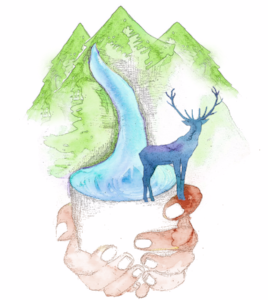Napenda Ndovu (Love For Elephants)
Georgia (George) Troup is a PhD student at the Australian National University’s Fenner School of Environment and Society, working in collaboration with Save the Elephants.
Her research investigates the social and nutritional drivers of crop-raiding elephants in Tsavo, Kenya, based at the Elephants and Bees Project in Sagalla, Taita Taveta. Specifically, George compares the nutritional quality of wild fodder consumed by elephants in the wild to what crop species they select from farms when crop-raiding, to determine if elephants are compensating for a lack in nutritional quality in wild fodder by engaging in risky crop-raiding behaviour. In addition, she is interested to see how the social dynamics of the crop-raiding elephants in Sagalla differ from those found in the wild of Tsavo East National Park. Through a personal interview, George shares insight into PhD research and her life in Tsavo.
What were the logistics before starting PhD research that you had to overcome?
Luckily, I had Save the Elephants to help me get started with many of the logistics and planning. I needed to secure a research permit and research visa, which are essential if you want to publish anything from your research. I also needed to get permission from Lala, (Head Research Scientists for the Tsavo Conservation Area) and the Senior Park Wardens to be able to conduct field research in Park along and drive off road. Before coming out to Kenya, I also needed to get Animal and Human Ethics approvals from my university. I also needed to purchase a research vehicle in Nairobi, which took quite a bit of time. I am now in the process of applying for permits to export my dung and plant samples overseas for analysis, which I have been told is a very long and tedious process!
Now that are you are one year into research, what are the joys and challenges of conducting elephant behavior research in Kenya?
The joys are that I get to spend so much time in the wild watching animals in their natural habitat. I love all the African animals and I am so fortunate to see lions, giraffes, cheetah, so many things, in addition to elephants of course, when out in the field! I enjoy visiting the farmers on the community we work with because they always have great stories to tell and are always genuinely happy to see you, which is a really nice feeling. It’s even more rewarding when you can tell that the farmers are appreciative of you being there and working to help them mitigate crop-raiding elephants. I also like living in another country at this point in my life, doing research, being independent, and having a great adventure!
As for the challenges, there can be really long days in the field. Some days are overwhelmingly hot and some days we may not see very many elephants, which makes collecting data very difficult! Things like getting permits and various approvals can be very time consuming, and involves lot of planning and chasing things up constantly. However, my supervisor from Save the Elephants, Lucy (Head of Save the Elephants’ Human-Elephant Coexistence Program), has been so great in supporting my research, and has really helped a lot in terms of the funding challenges I faced (which most research students would be able to relate to!). So without her generosity, grant writing would have been a significant challenge than it has been so far.
What is it like being in the field five times a week observing elephants
It’s amazing, I can get up-close and personal with wild elephants! Many people don’t get to do the same once in their life-time, and I get to do it every day. I can see how they interact in the wild, which is very special. It’s a huge privilege to be able to do this research. I’ve also become very familiar with the Park and where to find certain animals, like where lion packs can be found. Since my study is behavioral, I can learn a lot about one elephant in the hour that I observe it, see how a family interacts together, how mothers care for their calves, and how baby elephants play. In terms of my specific research, I also see how elephants consider what they eat - from what species they choose to what part of the plant they select and avoid.
What is your favorite trait of an elephant?
Personality trait - how gentle elephants are. Physical trait - their trunks. Elephants use their trunks for so many different things, and have such great control of such a complex thing! I love it when we approach an elephant group and they all stick their trunks up to smell us, it’s so sweet!
Do you have any recommendations for other scientists and conservationists starting out their PhD research?
Certainly get on to any permits and ethics approvals early, as well as funding opportunities. Be prepared to have things not go to plan as it will most likely happen – it’s not a PhD if something doesn’t go wrong! For example, my study focuses on crop-raiding, but Kenya has been experiencing a drought that has meant the crops in my study area have been unable to grow, and so of course there’s no crop-raiding this season. So, I will have to adapt my study to look at how elephant foraging behavior changes when in periods of drought, and as well as how their social dynamics change. Most importantly, have fun! Research requires a lot of planning and thought going into it, and that should be enjoyable if you are passionate about your study topic. I look at my time here in Kenya as my life and a great adventure for three years - not just doing my research.
“You know ... they say an elephant never forgets.
What they don’t tell you is, you never forget an elephant.”












